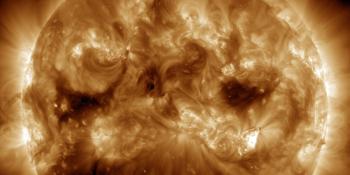Viewing archive of Friday, 2 October 2020
Daily bulletin on solar and geomagnetic activity from the SIDC
Issued: 2020 Oct 02 1231 UTC
SIDC Forecast
Solar flares
Quiet conditions (<50% probability of C-class flares)
Geomagnetism
Quiet (A<20 and K<4)
Solar protons
Quiet
| 10cm flux | Ap | |
|---|---|---|
| 02 Oct 2020 | 073 | 006 |
| 03 Oct 2020 | 072 | 004 |
| 04 Oct 2020 | 072 | 004 |
Bulletin
The solar activity was at very low levels with no significant flares recorded. The solar disk remains spotless and no significant flares are expected over the next 24 hours.
No Earth-directed Coronal Mass Ejections (CMEs) were observed in the available coronagraph imagery.
The greater than 10 MeV proton flux was at nominal levels in the past 24 hours, and is expected to remain so in the next 24 hours. The greater than 2 MeV electron flux was continuously recorded above the 10^3 pfu threshold over the past 24 hours, remaining greater than 10^4 pfu. The electron flux is expected to remain elevated over the next 24 hours.
Over the past 24 hours the solar wind conditions remained under the waning influence of the high-speed stream related to the positive-polarity coronal hole (CH82). The total interplanetary magnetic field, as recorded by ACE and DSCOVR, varied between 2 nT and 4 nT with a weak north-south component fluctuating in the range of -3 nT and 3 nT. In the past 24 hours the solar wind speed continued to decline varying between 580 km/s and 490 km/s. The solar wind conditions are expected to continue returning to background levels over the next 24 hours.
The geomagnetic conditions over the past 24 hours were mostly quiet to unsettled with maximum recorded Kp and K Dourbes indices equal to 3. Quiet to unsettled conditions are expected to continue over the next 24 hours. A new small-area negative-polarity coronal hole (CH83) has now formed on the western hemisphere close to the central meridian. As a result we might observe unsettled to active conditions after 2.5-3 days.
Today's estimated international sunspot number (ISN): 000, based on 11 stations.Solar indices for 01 Oct 2020
| Wolf number Catania | 000 |
| 10cm solar flux | 073 |
| AK Chambon La Forêt | 021 |
| AK Wingst | 012 |
| Estimated Ap | 012 |
| Estimated international sunspot number | 000 - Based on 26 stations |
Noticeable events summary
| Day | Begin | Max | End | Loc | Strength | OP | 10cm | Catania/NOAA | Radio burst types | |
|---|---|---|---|---|---|---|---|---|---|---|
| None | ||||||||||
Provided by the Solar Influences Data analysis Center© - SIDC - Processed by SpaceWeatherLive
All times in UTC
Current data suggests there is a slight possibility for aurora to appear at the following high latitude regions in the near future
Whitehorse, YTFairbanks, AK
Latest news
Latest forum messages
More topicsSupport SpaceWeatherLive.com!
A lot of people come to SpaceWeatherLive to follow the Sun's activity or if there is aurora to be seen, but with more traffic comes higher server costs. Consider a donation if you enjoy SpaceWeatherLive so we can keep the website online!

Latest alerts
Thursday, 10 April 2025
23:00 UTC - Geomagnetic activity
Active geomagnetic conditions (Kp4) Threshold Reached: 22:47 UTC
20:45 UTC - Hemispheric Power Index
The OVATION model predicts the Hemispheric Power Index to reach 50GW at 21:37 UTC
01:45 UTC - Geomagnetic activity
Active geomagnetic conditions (Kp4) Threshold Reached: 01:41 UTC
Space weather facts
| Last X-flare | 2025/03/28 | X1.1 |
| Last M-flare | 2025/04/08 | M1.5 |
| Last geomagnetic storm | 2025/04/06 | Kp5 (G1) |
| Spotless days | |
|---|---|
| Last spotless day | 2022/06/08 |
| Monthly mean Sunspot Number | |
|---|---|
| March 2025 | 134.2 -20.4 |
| April 2025 | 141.4 +7.2 |
| Last 30 days | 137.9 +0.4 |




